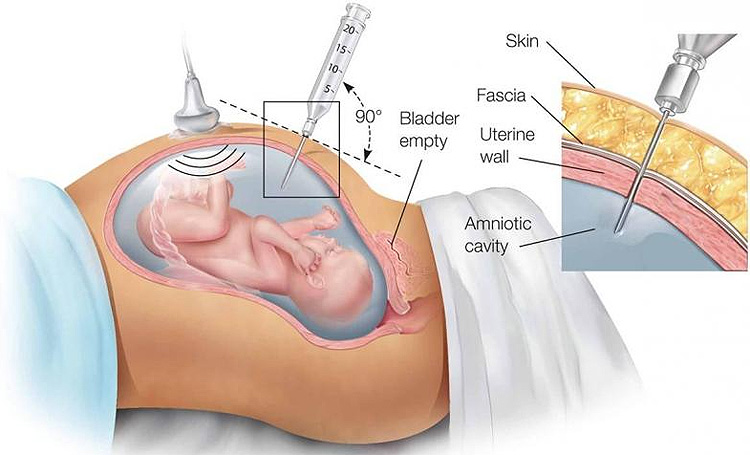Obstetrics and Gynaecology
Amniocentesis Treatment
Amniocentesis
During pregnancy, the fetus is surrounded by amniotic fluid, a substance is like water. Amniotic fluid contains live fetal cells and other substances (alpha-fetoprotein). These substances provide important information regarding the baby's health before birth. Amniocentesis is a prenatal test, in this test a small amount of amniotic fluid is removed from the sac surrounding the fetus for testing.
What is Amniocentesis?
During pregnancy, the fetus is surrounded by amniotic fluid, a substance is like water. Amniotic fluid contains live fetal cells and other substances (alpha-fetoprotein). These substances provide important information regarding the baby's health before birth. Amniocentesis is a prenatal test, in this test a small amount of amniotic fluid is removed from the sac surrounding the fetus for testing. The sample of amniotic fluid is removed with the help of a fine needle which is inserted into the uterus through the abdomen, under ultrasound guidance. The fluid is sent to a laboratory for analysis; different tests are performed on a sample of amniotic fluid, depending on the genetic risk and indication for the test. The amniocentesis is usually scheduled between the 15th and 18th week of pregnancy, if recommended by the doctor. The accuracy of amniocentesis ranges up to 99.4%. It is very rare that amniocentesis fails, but if it is unsuccessful this may be due technical problems, such as unable to collect an adequate amount of amniotic fluid or the collected cells fails to grow when cultured.
Why does the mother require?
If the baby has a higher than normal chance of developing birth defects or other problems, the mother may want to have an amniocentesis. The following risk factors can increase the chances of health problems in her baby:
- The mother is aged 35 years or older.

- There is a history of inherited disorders in the patient’s family.
- Other screening tests, such as the combined first-trimester screening test or the non-invasive prenatal test, have shown the baby may have health problems. Amniocentesis can provide a clear picture.
Before undergoing an amniocentesis the patient must consult her doctor.
Symptoms leading to Amniocentesis Test
Amniocentesis is the general term for a class of invasive procedures carried out during pregnancy, which take a sample of the amniotic fluid. It is always carried out when the wellbeing of the fetus is at question or the possibility of genetic disorders. Symptoms or situations leading to amniocentesis may include:
- Advanced Maternal Age
- Abnormal Ultrasound Results
- Positive Screening Test Results
- Family History of Genetic Disorders
- Infections or Inherited Conditions
- Multiple Miscarriages
- Concerns of Fetal Lung Development
Risks of having Amniocentesis
Amniocentesis carries various risks, these risks might include:
- Leaking amniotic fluid: In very rare cases, amniotic fluid leaks through the vagina after amniocentesis. However, in most cases, the amount of fluid lost is small and is stopped within one week, and the pregnancy is likely to continue normally.
- Miscarriage: Second-trimester amniocentesis carries a small risk of miscarriage, about 0.1 to 0.3%. Research suggests that the risk of pregnancy loss is higher for amniocentesis when done before 15 weeks of pregnancy.
- Needle injury: During amniocentesis, the baby might move into the path of the needle. Serious needle injuries are very rare.
- Rh sensitization: In very rare cases, amniocentesis might cause the baby's blood cells to enter the mother's bloodstream. If the mother has Rh-negative blood and she hasn't developed antibodies to Rh-positive blood, the patient will be given an injection of a blood product called Rh immune globulin after amniocentesis. This will prevent the mother’s body from producing Rh antibodies that can cross the placenta and damage her baby's red blood cells. A blood test is helpful in detecting if the antibodies are being produced by the patient.
- Infection: Very rarely, amniocentesis may trigger into the uterine infection.
- Infection transmission: If the mother has an infection, such as hepatitis C, toxoplasmosis or HIV/AIDS, the infection might be transferred to her baby during amniocentesis.
- Genetic amniocentesis is typically offered when the test results might have a significant impact on the management of the pregnancy. Ultimately, the decision to have genetic amniocentesis is up to the mother and her family.
What does the Amniocentesis show?
Chromosomal conditions
Chromosomal conditions affect the chromosomes, some examples of chromosomal conditions may include:
- Down syndrome: A condition that affects a person’s physical appearance, mental development and ability to learn; it is due to the presence of an extra chromosome, known as trisomy-21.
- Edwards syndrome: A condition that causes severe physical and mental abnormalities; it is also due to the presence of an extra chromosome, known as trisomy-18.
- Patow syndrome: A very rare but serious condition where newborn babies rarely survive for more than a few days; it is the result of an extra chromosome, known as trisomy-13.
Blood disorders
Inherited blood disorders can be checked by amniocentesis, such as:
- Sickle cell anemia: A condition where red blood cells (oxygen carrier) are in an unusual shape and texture.
- Thalassemia: In this condition, the body’s ability to create red blood cells is being affected.
- Hemophilia: In this condition blood’s clotting ability of the body is being affected.
Neural tube defects
Amniocentesis can also be used for testing neural tube defects. The neural tube is the tissue in early pregnancy that later on develops into the spine and then into the nervous system. A neural tube defect can lead to conditions such as spina bifida, which can cause difficulty in learning and also the paralysis of the lower limbs.
Musculoskeletal disorders
Amniocentesis is used to diagnose conditions that affect the musculoskeletal system, such as muscular dystrophy. Muscular dystrophy is an inherited condition that causes muscles to gradually weaken, which results in an increasing level of disability.
Other genetic conditions
Amniocentesis can also help in diagnosing a number of genetic conditions, such as Marfan syndrome, a condition in which the body’s connective tissues are affected, the connective tissues holding all the body’s cells, organs and tissue together.
Facilities and Services offered for International Patients for Amniocentesis Test
Numerous health care organizations that provide services for international patients offer a number of facilities and services to overcome the challenges of amniocentesis. These services often seek to meet the clinical, organizational, and anthropological wants of the foreign patients. Here are the common facilities and services offered:
- Medical Consultation
- Language Assistance
- Diagnostic and Pre-Procedure Testing
- Genetic Testing
- Post-procedure Care
- Accommodation and Travel Arrangements
- Recovery Support
Pre-Treatment Process of Amniocentesis
Preparation for amniocentesis has some simple steps to make sure that the process is safe for women and for the baby. Here is a detailed overview of what to expect before undergoing amniocentesis:
- Initial Consultation
- Pre-Procedure Testing
- Preparation for the Procedure
- Mental and Emotional Preparation
- Decision Making
Diagnostic Tests for Amniocentesis
The amniotic fluid collected during the procedure can be tested for a number of conditions such as genetic disease, infections, or problems with the development of the fetal lungs. Here are the main diagnostic tests that can be performed using the amniotic fluid obtained during amniocentesis:
- Chromosomal Testing
- Genetic Testing
- Neural Tube Defect Screening
- Infection Detection
- Fetal Lung Maturity Test
- Biochemical Testing
- Rhesus Factor Testing
- DNA Paternity Testing
- Fetal Chromosome Microarray Analysis
Amniocentesis Procedure
- Before the start of the procedure, a local anaesthetic is given to the mother in order to relieve the pain felt during the insertion of the needle, which is used for withdrawing the fluid.
- After the local anaesthetic takes its effect, a needle is inserted through the mother's abdominal wall, through the wall of the uterus, and finally into the amniotic sac.
- A physician, with the help of ultrasound, extracts approximately 20ml of amniotic fluid by puncturing the sac in an area away from the fetus.
- Fetal cells are separated from the extracted sample when used for prenatal genetic diagnosis.
- The cells are grown in a culture medium, and then they are fixed and stained.
- The chromosomes are examined under a microscope for any abnormalities.
- The most common abnormalities detected are Down syndrome, Edwards syndrome, and Turner syndrome.
- In regard to the fetus, the puncture seals and the liquid is replenished by the amniotic sac over the next 24–48 hours.
Post-Treatment Process of Amniocentesis
The steps that are followed after amniocentesis is equally important to the patient’s well being as any invasive procedure. Despite the low risk for patients, there are things to be aware of in relation to complications and what to do after the procedure. Below is a detailed overview of what to expect after undergoing amniocentesis:
- Immediate Post-Procedure Care
- Physical Recovery
- Follow-up Appointments
- Recovery Timeline
- Emotional and Psychological Support
Success Rate of Amniocentesis Test and Treatment
Even though the diagnostic efficacy of the amniocentesis is exceedingly high, coupled with the minimal risk of complications. As for the success rate that includes such an Effect as an absence of complications combined with the appropriately positive results, it makes around 99.7% for most of the women choosing the abortion procedure.
Best Hospitals for Amniocentesis Test and Treatment
- Artemis Hospital, Gurgaon
- Medanta The Medicity, Gurgaon
- Fortis Memorial Research Institute, Gurgaon
- Max Hospital, Saket
- BLK-Max Super Speciality Hospital, New Delhi
Best Doctors for Amniocentesis Test and Treatment
- Dr. Ashutosh Gupta
- Dr. Geetanjli Behl
- Dr. Seema Thakur
- Dr. S.N Basu
- Dr. Dinesh Kansal
Why Choose GetWellGo for Pregnancy Tests Amniocentesis?
While opting for GetWellGo for amniocentesis there are several points in their services, expertise, and way how they treat their clients that can benefit from. While the specific benefits would depend on the clinic or hospital's offerings, here are several reasons why you might choose GetWellGo for amniocentesis:
- Expert Medical team
- Comprehensive Prenatal Care
- High Accuracy and Reliable Results
- International Patient Services
- Patient-Centred Approach
- Comprehensive Follow-up Care
- Cost-Effective Services
Conclusion
Prenatal diagnosis by amniocentesis is a vital diagnostic tool in evaluating the health of a fetus, possible genetic, chromosomal or developmental disorders. It is done between fifteen and twenty weeks of pregnancy and it has 99% reliability in finding chromosomal anomalies, and 98-99% reliability in identification of genetic disease. Primarily harmless, it can also result in a miscarriage as well as pose an infection threat. Patient education is significant, and let me say that if it is done in the right center then it is safe and efficient.
FAQ
1. Which advantages can be considered to amniocentesis?
- Accurate Diagnosis: Amniocentesis permits highly accurate results in diagnosing chromosomal and genetic conditions; results are 99 percent accurate in many genetic disorders.
- Early Detection: This can facilitate timely diagnosis of some fetal conditions that may enable a health practitioner to decide on further management and/or care as well as overall pregnancy management.
- Informed Decision-Making: For example, awareness of early results enables parents to make decisions they want to have in case their pregnancy is affected or may require some treatment.
- Peace of Mind: To many families, amniocentesis can be useful in offering some guarantee on the state of the fetus.
2. What are the facts regarding success rate in amniocentesis among pregnant women?
- Diagnostic Accuracy: The process is very effective with a 99% rate of success in identifying presence of chromosomal defects and genetic disorders.
- Risk of Miscarriage: The reported rate of miscarriage attributable to amniocentesis is small, about one in 300 to one in a thousand. This makes the procedure quite safe for most women according to the myths.
- Other Complications: Complications such as infection, fetal damage or rupture of the membranes are however rare with an occurrence of one per 1600 to 2000 attempted biopsies.
3. What is the recovery time for amniocentesis?
- Immediate Recovery: After the procedure the majority of women are able to return to their everyday routine with the exception of the first 24-48 hours when it is best to rest.
- Post-Procedure Symptoms: Some women may have mild cramping, light bleeding or spotting within the 1st 1 to 2 weeks after the procedure. Of course, these symptoms are, usually, self-limiting to a certain extent.
- Avoid Strenuous Activities: Patients are advised not to lift any heavy object or do any rigorous, including sexual intercourse, within three to four days after the procedure.
TREATMENT-RELATED QUESTIONS
GetWellGo will provide you end-to-end guidance and assistance and that will include finding relevant and the best doctors for you in India.
A relationship manager from GetWellGo will be assigned to you who will prepare your case, share with multiple doctors and hospitals and get back to you with a treatment plan, cost of treatment and other useful information. The relationship manager will take care of all details related to your visit and successful return & recovery.
Yes, if you wish GetWellGo can assist you in getting your appointments fixed with multiple doctors and hospitals, which will assist you in getting the second opinion and will help you in cost comparison as well.
Yes, our professional medical team will help you in getting the estimated cost for the treatment. The cost as you may be aware depends on the medical condition, the choice of treatment, the type of room opted for etc. All your medical history and essential treatment details would be analyzed by the team of experts in the hospitals. They will also provide you with the various types of rooms/accommodation packages available and you have to make the selection. Charges are likely to vary by the type of room you take.
You have to check with your health insurance provider for the details.
The price that you get from GetWellGo is directly from the hospital, it is also discounted and lowest possible in most cases. We help you in getting the best price possible.
No, we don't charge patients for any service or convenience fee. All healthcare services GetWellGo provide are free of cost.
Top Doctors for Obstetrics and Gynaecology
Top Hospitals for Obstetrics and Gynaecology
Contact Us Now!
Fill the form below to get in touch with our experts.

.png)





